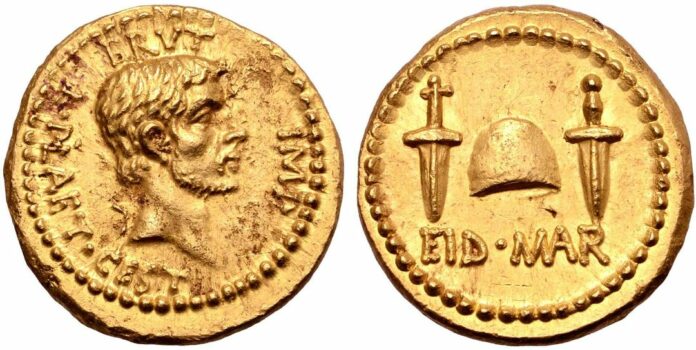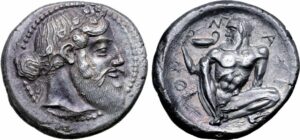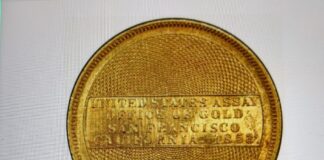
Only recently it was announced that Richard Beale, CEO and owner of the London-based Roma Numismatics auction house, was arrested in New York on his way to the NYINC. The Manhattan District Attorney accuses him of the unlawful acquisition of coins from Italy, Greece and the Gaza Strip and of obtaining falsified provenances to conceal the coins’ illegal origin. Beale is charged with the following crimes: Grand Larceny in the First and Second Degree, Criminal Possession of Stolen Property in the First and Second Degree, Conspiracy in the Fourth Degree, and Scheme to Defraud in the First Degree.
At the centre of the investigation against Beale are two coins, whose provenances he allegedly falsified. Both of them were sold on 29 October 2020 at Roma Numismatic’s auction 20 in London. The first piece is the famous EID MAR aureus of Brutus that fetched a hammer price of £3,240,000 ($4,188,393) at the sale. That makes this specimen the most expensive ancient coin to date. The second piece is a Naxos tetradrachm dated to about 460 BC. It sold at £240,000 ($291,682).
Both coins were offered with the same provenance: “From the collection of the Baron Dominique de Chambrier, original attestation of provenance included; Ex collection of Bernard de Chambrier (1878-1963) and Marie Alvine Irma von Bonstetten (1893-1968); Ex collection of the Baron Gustave Charles Ferdinand von Bonstetten, Chamberlain to Ferdinand I, Emperor of Austria.”
According to the complaint, Beale already admitted “that he paid for the provenance“ for both coins, although it remains unclear what is actually meant by that and who he paid. The prosecution also stated that Beale said “that this was the first and only time that [he] had ever paid for provenance”.

The Manhattan District Attorney’s Office accuses the internationally renowned coin dealer Italo Vecchi as a co-conspirator. He is currently working as a Consultant Specialist for Roma Numismatics. Authorities in the US are familiar with Italo Vecchi as they detained him in 1992 when he tried to smuggle undeclared Greek coins into the country.
Vecchi is considered to be the middleman who gave the Brutus aureus and the Naxos tetradrachm to Beale in 2013 and 2014 respectively to be sold at auction. Beale allegedly tried to sell these coins in 2015 in the context of the New York International Numismatic Convention. An informant quoted by the prosecution states that he saw photographs of the coins on Beales smartphone. The informant goes on to say that regarding their provenance, Richard Beale stated that the pieces were from “an old Swiss collection”. The sale did not take place. In 2020, both pieces appeared at an auction sale with impressive provenances. A second informant claims that he pointed out to Vecchi and Beale that the provenances were false. According to the informant, Vecchi and Beale then offered 100,000 Swiss francs to him to make him sign the documents that confirmed the coins’ provenance, but the informant refused.
So far it is not known where the coins really came from. Italo Vecchi has not been charged yet. According to artnews.com, both coins were seized in the United States. The Naxos tetradrachm was repatriated in February 2023 alongside other seized works of art. It was handed over to the Italian authorities.
The Gaza Hoard
Further charges against Beale regard the trade of coins from the so-called Gaza Hoard, which included numerous tetradrachms and the significantly rarer decadrachms of Alexandre the Great. Beale is accused of repeatedly selling pieces that were found in 2017, perhaps already in 2013, in the Gaza Strip through his Roma Numismatics auction house. It is claimed that the pieces entered the coin trade illegally via Israel.
Several years ago, Roma Numismatics was already accused of trafficking these coins in a BBC documentary. According to the current complaint, Beale purchased the coins from a convicted antiquities trafficker and offered them with false provenances such as “from a private Canadian collection” or “Ex private European collection”. Here, too, Beale is said to have already partly admitted that he intentionally advertised the pieces with false provenances.
Investigations are ongoing. Beale’s next court appearance is scheduled for 8 May 2023. As usual, the defendant is considered innocent until proven guilty. The defendant can withdraw statements at any time.
Reactions from the Coin Trade
All representatives of the coin trade that spoke out so far were shocked about the alleged fraud committed by Beale and Vecchi. Daniel F. Sedwick, President of the International Association of Professional Numismatists, told us: “The IAPN unequivocally stands against misrepresentation of provenance, and we stress it is not a normal occurrence in the coin industry.” But he also points out that there is a gap in the system: “A system like the UK’s Treasure Act would go further to deter theft of cultural property by requiring the country of origin to pay a fair market price for any found item it deems important. “
In its press release, the IAPN was clear to state that such a conduct goes against the moral and ethical code of this leading association of the coin industry: “If proved to be true, these allegations would constitute a clear and very serious violation of the rules of the Association.”
Furthermore, the IAPN emphasises that Roma Numismatics has never been a member of the association. Things are different regarding Italo Vecchi. Since membership is limited to companies and individual persons cannot become members, Italo Vecchi – who worked for several IAPN member companies before his retirement – was elected corresponding member. In 2007, he became honorary member of the association due to the services he rendered for numismatics in general. The IAPN states in its press release of 13 March 2023: “Given the New York District Attorney’s allegations, on March 3rd, 2023, the IAPN Executive Committee decided to suspend Mr. Vecchi pending resolution of these charges.”
An Unusual Career
In most cases, coin dealers build up a broad numismatic network before setting up their company. Moreover, they usually focus on pieces from the lower price segment in their first auction sales. The former member of the British Army Richard Beale, however, surprised the numismatic world with his first sale. Founded in 2009, the company offered a wealth of high-quality ancient coins on 15 October 2010. 35 lots had estimates in the five-digit range, and many more in the high four-digit range.
The most detailed report on the charges against Richard Beale was published by Artnews.




